|
|
|
Sort Order |
|
|
|
Items / Page
|
|
|
|
|
|
|
| Srl | Item |
| 1 |
ID:
170948
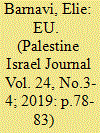

|
|
|
| 2 |
ID:
170964
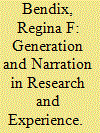

|
|
|
|
|
| Summary/Abstract |
"It is not talked about” and “you do not hear about it” are among the comments made by my colleagues in Israel regarding 1967 or the Six-Day War when they approached me to participate in this project with them. Whether a short or a non-war, as some interviewees characterized it, June 5th and the subsequent days of 1967 changed the lives of Israelis and Palestinians profoundly. Thus, I embarked on a joint project together with Prof. Aziz Haidar and Prof. Hagar Salamon. Our undertaking rests on the conviction that an interview project focused on posing the question ‘how did this war impact everyday lives?’ to individuals from all walks of lives, ethnic and/or national affiliation,gender, and political conviction contributes in important ways to much needed conversations in present day Israel/Palestine: there is little to no knowledge among the two main groups regarding the other’s perception of the events, and there are many deeply rooted assumptions about each other which such a project can bring into common discourse. Occupation and settlements, wars and uprisings over the past decades all have as a backdrop the new territorial situation brought about by 1967. The individual and familial everyday experience of the war and its subsequent impact deserve to be spelled out in their very diversity and be brought to a public awareness that all too easily sees but two sides rather than millions of lives and complicated biographies with specific accommodations to a territorial, familial, and economic situation. We decided to initiate a project that focused on personal stories which we hoped to bring into the public sphere to demonstrate that the historical master narratives told about 1967 in Israel/Palestine are an oversimplification.
|
|
|
|
|
|
|
|
|
|
|
|
|
|
|
|
| 3 |
ID:
170903


|
|
|
|
|
| Summary/Abstract |
In 1947, my grandfather Hanns Ludin was executed as a Nazi war criminal in Bratislava. He was Nazi Germany’s envoy to Slovakia from 1941 to 1945 and was instrumental in the deportation of the Slovak Jews, most of whom were murdered in the concentration camps. His participation in the Holocaust is a painful fact which some relatives from my mother’s family will not fully acknowledge or come to terms with until this very day.
|
|
|
|
|
|
|
|
|
|
|
|
|
|
|
|
| 4 |
ID:
170906


|
|
|
| 5 |
ID:
170904


|
|
|
|
|
| Summary/Abstract |
When the editors of the Palestine-Israel Journalasked me to contribute to this special issue, I was both flattered and frustrated. Flattered because of the recognition of what such an invitation entails, given that I gave up writing on Palestine-Israel matters a long time ago, and frustrated because I didn’t have the time to do the research needed to address the subject in a fair and comprehensive manner and to give justice to the details of possible developments that I may be unaware of in the official position of the German Government or the positions of the disparate German political parties. So, the editors and I agreed that I would write a brief viewpoint. The following is just that.
|
|
|
|
|
|
|
|
|
|
|
|
|
|
|
|
| 6 |
ID:
170905


|
|
|
|
|
| Summary/Abstract |
The link between the Holocaust and the Nakba is probably the most charged for both Jews and Palestinians. To Jews, the Holocaust is a foundational past, and some would say a unique one, and thus to discuss it in conjunction with any other event may appear to banalize the extermination of the Jews and even to present a moral and political threat. To Palestinians, the Nakba is a foundational past, and since the Jews invoke the Holocaust to justify Zionism and Israel’s actions, to many Palestinians recognition of the Holocaust is tantamount to legitimizing the injustices of the Nakba and the iniquities that Israel continues to wreak upon them. To Germans as well, the juxtaposition of these two events is a sensitive matter, since they feel particularly responsible for the memory of the Holocaust.
|
|
|
|
|
|
|
|
|
|
|
|
|
|
|
|
| 7 |
ID:
170959
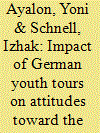

|
|
|
| 8 |
ID:
170908


|
|
|
|
|
| Summary/Abstract |
The web of relationships between Israel, Germany, and Palestine is complex, especially because its historical coordinates are easy to decode, indeed obvious: That Germany committed monstrous crimes against the Jews in the 20th Century and that Jews carried out the Israeli state-building process on the backs of the Palestinians is evident. However, the question arises of the causal relations between both historical events and their relevance for the current
web of relationships. The foundation of the Zionist State is based on the urgency of a sanctuary for Jews as a consequence of the Shoah (Holocaust) and accelerated by the international consensus in its favor. Therefore, the connection between the Shoah and Israel arises by itself. However, consequently, as well with the necessary adaptation made, the connection of the Palestinians to Germany: If the foundation of Israel was a consequence of the Shoah caused by the Germans, this also implies a German connection with the historical injustice committed to the Palestinians by Jews through the founding of the state.
|
|
|
|
|
|
|
|
|
|
|
|
|
|
|
|
| 9 |
ID:
170947
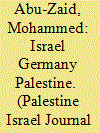

|
|
|
| 10 |
ID:
170961


|
|
|
|
|
| Summary/Abstract |
The issue of Israelis leaving Israel has been a contentious topic since the foundation of the state in 1948. To be precise, the immigration of Jews to Israel has been encouraged and legally enshrined, while their emigration has been discouraged. Both carry legal as well as also social consequences for the individuals concerned. A plethora of historical sources cover early Israeli emigration to previous homelands (Silber 2008; Webster 1995), but most research that focuses on present-day Israeli emigration covers English-speaking countries such as the United States, Canada, Australia, and the United Kingdom, where the Israeli populations are sizeable and long established (Cohen 2011). Although the history of Jewish immigration to these countries should not be clouded in idealism, all are countries not tainted with perpetration of the Holocaust. On the other hand, migration to German was a dual taboo – first, because one left Israel and second, because one left for Germany. Furthermore, this migration did not at all fit with the dominant Zionist Israeli discourse.
|
|
|
|
|
|
|
|
|
|
|
|
|
|
|
|
| 11 |
ID:
170921


|
|
|
|
|
| Summary/Abstract |
My TA (Teaching Assistant), who looked like she was in a minor state of shock, walked up to me outside one of the classrooms where the final exam in Introduction to Psychology for the first-year Social Work students was taking place.
|
|
|
|
|
|
|
|
|
|
|
|
|
|
|
|
| 12 |
ID:
170953
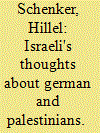

|
|
|
|
|
| Summary/Abstract |
My first contact with Holocaust survivors was when I joined Kibbutz Barkai in 1963. The founders of the kibbutz, members of the socialist-left Zionist Hashomer Hatzair youth movement, were all Holocaust survivors from Poland and Romania. Most had survived the horrors of the concentration camps, while a few had escaped and joined the Red Army or partisans fighting the Nazis. They came to the fledgling State of Israel to rebuild their broken lives.
|
|
|
|
|
|
|
|
|
|
|
|
|
|
|
|
| 13 |
ID:
170951
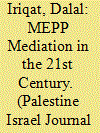

|
|
|
|
|
| Summary/Abstract |
During the last three decades, the world witnessed rising hopes for a peaceful resolution of the Palestinian-Israeli conflict. There were many efforts, most of which ended in failure. July 2000 witnessed the most significant attempt at the Camp David summit, where the final-status issues were placed on the negotiations table, but no deal was completed. Since then, violence and instability have escalated in the region, and today a peacefully negotiated deal is definitely far from reality.
|
|
|
|
|
|
|
|
|
|
|
|
|
|
|
|
| 14 |
ID:
170962


|
|
|
|
|
| Summary/Abstract |
The Evolution of the Palestinian Diaspora in Germany
The Palestinian diaspora primarily originated with the Israeli-Palestinian conflict; before 1948, Palestinians did not leave the country in significant numbers. As a result of the conflict, huge waves of people left the Palestinian Territory, especially in 1948 and, to a lesser extent, also in 1967. Even though Palestinian communities were established throughout Western Europe and the United States as a result of this emigration, the majority live in the Arab countries (Di Bartolomeo, Jaulin, & Perrin, 2011).
|
|
|
|
|
|
|
|
|
|
|
|
|
|
|
|
| 15 |
ID:
170920


|
|
|
|
|
| Summary/Abstract |
Jerusalem
I first heard of Germany from my father when I was a boy in the early 1950’s. We were then a refugee family as a result of the 1948 Arab-Israeli war, having left our family home in the West Jerusalem Arab neighborhood of Qattamon to move to a Franciscan-owned property in the Old City along with some other Christian families who had fled for their lives. As a child, I did not grasp the full significance of the Nuremberg trials from the few references my father made to them. What I always did recall vividly was that my father was always visibly disturbed when he mentioned Germany and the Germans. He would have a serious look in his face, and on a few occasions I heard him murmuring vague accusations with regard to the predicament in which our family and our people found themselves. It was only years later, in high school, that I began to understand my father. Somehow the Nuremberg trials had agitated him and stirred up feelings of anger toward the Americans and the British who, as the victors in World War II, were deemed by him and others of his generation to be responsible for the disaster that befell the Palestinian people in 1948. To my father and others like him, the Allies were not only in charge of conducting the trials but, in a more personal way, were also seen as “out to get” people like him, possibly due to a conscious or unconscious wish to have seen a different outcome in World War II.
|
|
|
|
|
|
|
|
|
|
|
|
|
|
|
|
| 16 |
ID:
170955
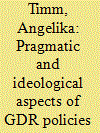

|
|
|
| 17 |
ID:
170907


|
|
|
|
|
| Summary/Abstract |
On May 17, 2019, the German Bundestag adopted a motion by the parties of the Grand Coalition (CDU/CSU and SPD), the Greens and the liberals (FDP) with the objective of "resolutely opposing the Boycott, Divestment, and Sanctions movement (BDS) –fighting anti-Semitism."
|
|
|
|
|
|
|
|
|
|
|
|
|
|
|
|
| 18 |
ID:
170957
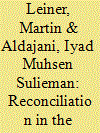

|
|
|
|
|
| Summary/Abstract |
This article explores an innovative approach to finding a solution to the existing and imminent violent struggles in the Middle East and North Africa (MENA), particularly with regard to the issue of reconciliation in the Israeli-Palestinian conflict. The article defines a scientific approach adopted by the Jena Center for Reconciliation Studies (JCRS), cited as the Hölderlin perspective (Martin Leiner, Susan Flamig, 2012, p. 18). It illustrates the philosophical foundation for applying the Hölderlin Perspective, using Phronetic Social Science, to engage in reconciliation processes in the middle of conflicts. It also illustrates the German approach toward the Israeli Palestinian conflict and, lastly, presents some concrete, tangible results that
have already been achieved as well as projects that are currently under way with regard to the MENA region.
|
|
|
|
|
|
|
|
|
|
|
|
|
|
|
|
| 19 |
ID:
170909
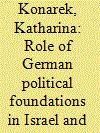

|
|
|
|
|
| Summary/Abstract |
The German Political Foundations: Think-and-Do Tanks in a Globalized World
Before discussing the work of German political foundations abroad, an important remark on the terminology and the concept of ‘foundation’ must be made. The German term is ‘Stiftung.’ ‘Stiftungen’ in the sense of the creator of the word – the Greek philosopher Plato – are purely non-profit organizations administrated by a board of trustees. Nowadays, they are civil law entities that, with the aid of property and assets, pursue a purpose defined by their founder.1 German political ‘Stiftungen’ differ from such organizations in the traditional understanding of the word. Rather, these are registered associations that use the term ‘Stiftung’ as a name component. Compared to more traditional ‘Stiftungen,’ they do not own large properties and are not bound by the goals of any founder. They can organize their agenda and program flexibly, while at the same time benefiting from the positive associations of the term ‘Stiftungen.’ As classical foundations, however, German political foundations are non-profit organizations whose purpose is to promote political education and strengthen democracy and civil society.
|
|
|
|
|
|
|
|
|
|
|
|
|
|
|
|
| 20 |
ID:
170950


|
|
|
|
|
| Summary/Abstract |
Establishing German-Israeli Relations
The first public debate on the relationship of the West German state to Israel took place shortly after the foundation of the Federal Republic of Germany (Bundesrepublik Deutschland). A reparation agreement with Israel was pushed forward by German Chancellor Konrad Adenauer, who perceived the agreement as a moral means of restitution, but also as a signal to the outside world to rehabilitate Germany.
|
|
|
|
|
|
|
|
|
|
|
|
|
|
|
|
|
|
|
|
|